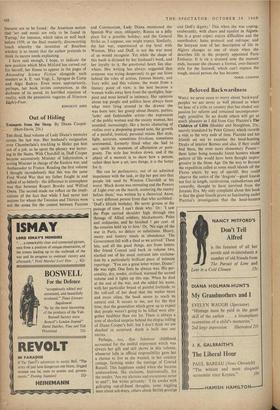in print about the vile state of ladies' lavatories at
the big London railway stations; next day the Mirror followed it up with the immortal head- line 'The Times spends a penny.' No processions marched to commemorate the day, not a single Pedestal was honoured with a wreath; but the Protest last year has not been without its effects. I Went along to the two worst stations named, and found that Euston has at least replaced a few of the cracked basins (though newspaper, and not the Times litter, still lies on the floor, and there is an inescapable air of Gothic grime). At Pad- dington the results are even more spectacular : they're pulling the old loo down (boo!) and build- ing another (hooray !). The irony of the Paddington situation is that the Times need not, and probably in its private life did not, ever go near the station ladies' room at all: because of the Paddington Hotel. Of Course, you are not supposed just to walk into the
The Ladies, God Bless 'Em
By KATHARINE WHITEHORN of Greek peasants and running rather behind the facilities offered by municipal bus stations in depressed areas are the facilities provided by most pubs. Possibly this is because pubs began as all-male establishments and are surprised at them- selves for having a ladies' room at all; but this still seems a feeble explanation. Why are pubkeepers' wives all eight feet high or midgets, since it is pre- sumably they who fix the height of the mirror, if any?
Why is there never a light strong enough to enable one to counteract with cosmetics the rav- ages of alcohol? Are the pubkeepers rationed by the brewers to one roll of paper and one cake of soap a year, and forbidden to supply towels in case they are used for wiping the sloppy floor? We are often told that brewers are worried be- cause people do not drink more beer : I suppose nobody has ever been unladylike enough to point out to them that one important reason for drink- ing shorts is the desire not to be forced to visit the amenities before closing time.
Providing poor ladies' rooms is, in the long run, a short-sighted policy, since women remember these things longer than the taste of the beer or the smile of the barman. I had a spectacular row with a roadhouse on the Great West Road once over a ladies' room which had a chipped basin, cold water only, and no paper, soap or towel. The row reached boiling point when I was told that I should not have strayed there in the first place, since it was the staff washroom. No wonder waitresses are unimpressed by complaints about dirty cups or hairs in the soup.
The more imaginative stores and restaurants do realise the importance of all this, and have even grasped the fact that it is often small details which count. The new John Lewis building has won the hearts of all not only by having a ladies' room somewhat nearer than the fifth floor, but by providing nailbrushes (which is more, I might add, than can be said for the Savoy); The Baron of Beef in Gutter Lane has a small but marvellous ladies' room filled with hand cream, clothes brushes, eau de cologne, the lot—a policy particu- larly enlightened since it must have a mainly male clientele. Even some petrol stations are beginning to realise the selling value of a rest room, and it may not be long before we, like Americans, can define them as 'places where you till the tank and drain the family,'














































 Previous page
Previous page